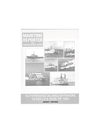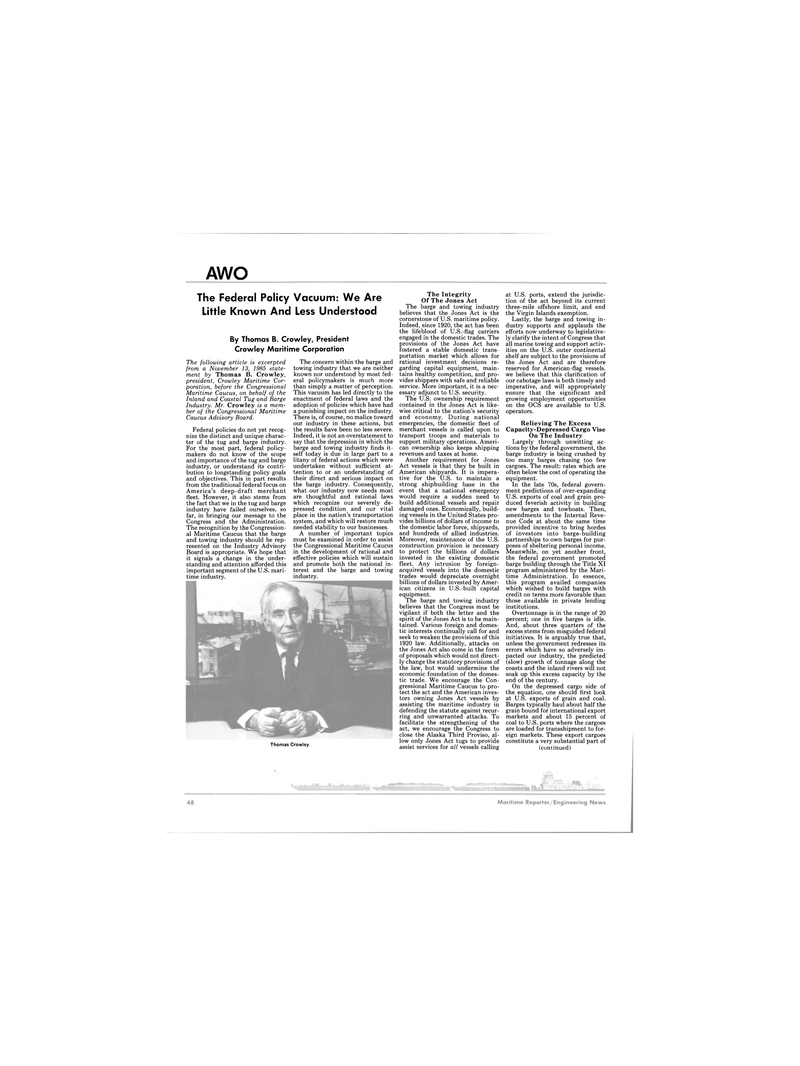
Page 46: of Maritime Reporter Magazine (January 1986)
Read this page in Pdf, Flash or Html5 edition of January 1986 Maritime Reporter Magazine
AWO
The Integrity
Of The Jones Act
The barge and towing industry believes that the Jones Act is the cornerstone of U.S. maritime policy.
Indeed, since 1920, the act has been the lifeblood of U.S.-flag carriers engaged in the domestic trades. The provisions of the Jones Act have fostered a stable domestic trans- portation market which allows for rational investment decisions re- garding capital equipment, main- tains healthy competition, and pro- vides shippers with safe and reliable service. More important, it is a nec- essary adjunct to U.S. security.
The U.S. ownership requirement contained in the Jones Act is like- wise critical to the nation's security and economy. During national emergencies, the domestic fleet of merchant vessels is called upon to transport troops and materials to support military operations. Ameri- can ownership also keeps shipping revenues and taxes at home.
Another requirement for Jones
Act vessels is that they be built in
American shipyards. It is impera- tive for the U.S. to maintain a strong shipbuilding base in the event that a national emergency would require a sudden need to build additional vessels and repair damaged ones. Economically, build- ing vessels in the United States pro- vides billions of dollars of income to the domestic labor force, shipyards, and hundreds of allied industries.
Moreover, maintenance of the U.S. construction provision is necessary to protect the billions of dollars invested in the existing domestic fleet. Any intrusion by foreign- acquired vessels into the domestic trades would depreciate overnight billions of dollars invested by Amer- ican citizens in U.S.-built capital equipment.
The barge and towing industry believes that the Congress must be vigilant if both the letter and the spirit of the Jones Act is to be main- tained. Various foreign and domes- tic interests continually call for and seek to weaken the provisions of this 1920 law. Additionally, attacks on the Jones Act also come in the form of proposals which would not direct- ly change the statutory provisions of the law, but would undermine the economic foundation of the domes- tic trade. We encourage the Con- gressional Maritime Caucus to pro- tect the act and the American inves- tors owning Jones Act vessels by assisting the maritime industry in defending the statute against recur- ring and unwarranted attacks. To facilitate the strengthening of the act, we encourage the Congress to close the Alaska Third Proviso, al- low only Jones Act tugs to provide assist services for all vessels calling at U.S. ports, extend the jurisdic- tion of the act beyond its current three-mile offshore limit, and end the Virgin Islands exemption.
Lastly, the barge and towing in- dustry supports and applauds the efforts now underway to legislative- ly clarify the intent of Congress that all marine towing and support activ- ities on the U.S. outer continental shelf are subject to the provisions of the Jones Act and are therefore reserved for American-flag vessels, we believe that this clarification of our cabotage laws is both timely and imperative, and will appropriately ensure that the significant and growing employment opportunities on the OCS are available to U.S. operators.
Relieving The Excess
Capacity-Depressed Cargo Vise
On The Industry
Largely through unwitting ac- tions by the federal government, the barge industry is being crushed by too many barges chasing too few cargoes. The result: rates which are often below the cost of operating the equipment.
In the late 70s, federal govern- ment predictions of over-expanding
U.S. exports of coal and grain pro- duced feverish activity in building new barges and towboats. Then, amendments to the Internal Reve- nue Code at about the same time provided incentive to bring hordes of investors into barge-building partnerships to own barges for pur- poses of sheltering personal income.
Meanwhile, on yet another front, the federal government promoted barge building through the Title XI program administered by the Mari- time Administration. In essence, this program availed companies which wished to build barges with credit on terms more favorable than those available in private lending institutions.
Overtonnage is in the range of 20 percent; one in five barges is idle.
And, about three quarters of the excess stems from misguided federal initiatives. It is arguably true that, unless the government redresses its errors which have so adversely im- pacted our industry, the predicted (slow) growth of tonnage along the coasts and the inland rivers will not soak up this excess capacity by the end of the century.
On the depressed cargo side of the equation, one should first look at U.S. exports of grain and coal.
Barges typically haul about half the grain bound for international export markets and about 15 percent of coal to U.S. ports where the cargoes are loaded for transshipment to for- eign markets. These export cargoes constitute a very substantial part of (continued) Thomas Crowley
The Federal Policy Vacuum: We Are
Little Known And Less Understood
By Thomas B. Crowley, President
Crowley Maritime Corporation
The following article is excerpted from a November 13, 1985 state- ment by Thomas B. Crowley, president, Crowley Maritime Cor- poration, before the Congressional
Maritime Caucus, on behalf of the
Inland and Coastal Tug and Barge
Industry. Mr. Crowley is a mem- ber of the Congressional Maritime
Caucus Advisory Board.
Federal policies do not yet recog- nize the distinct and unique charac- ter of the tug and barge industry.
For the most part, federal policy- makers do not know of the scope and importance of the tug and barge industry, or understand its contri- bution to longstanding policy goals and objectives. This in part results from the traditional federal focus on
America's deep-draft merchant fleet. However, it also stems from the fact that we in the tug and barge industry have failed ourselves, so far, in bringing our message to the
Congress and the Administration.
The recognition by the Congression- al Maritime Caucus that the barge and towing industry should be rep- resented on the Industry Advisory
Board is appropriate. We hope that it signals a change in the under- standing and attention afforded this important segment of the U.S. mari- time industry.
The concern within the barge and towing industry that we are neither known nor understood by most fed- eral policymakers is much more than simply a matter of perception.
This vacuum has led directly to the enactment of federal laws and the adoption of policies which have had a punishing impact on the industry.
There is, of course, no malice toward our industry in these actions, but the results have been no less severe.
Indeed, it is not an overstatement to say that the depression in which the barge and towing industry finds it- self today is due in large part to a litany of federal actions which were undertaken without sufficient at- tention to or an understanding of their direct and serious impact on the barge industry. Consequently, what our industry now needs most are thoughtful and rational laws which recognize our severely de- pressed condition and our vital place in the nation's transportation system, and which will restore much needed stability to our businesses.
A number of important topics must be examined in order to assist the Congressional Maritime Caucus in the development of rational and effective policies which will sustain and promote both the national in- terest and the barge and towing industry.

 45
45

 47
47
